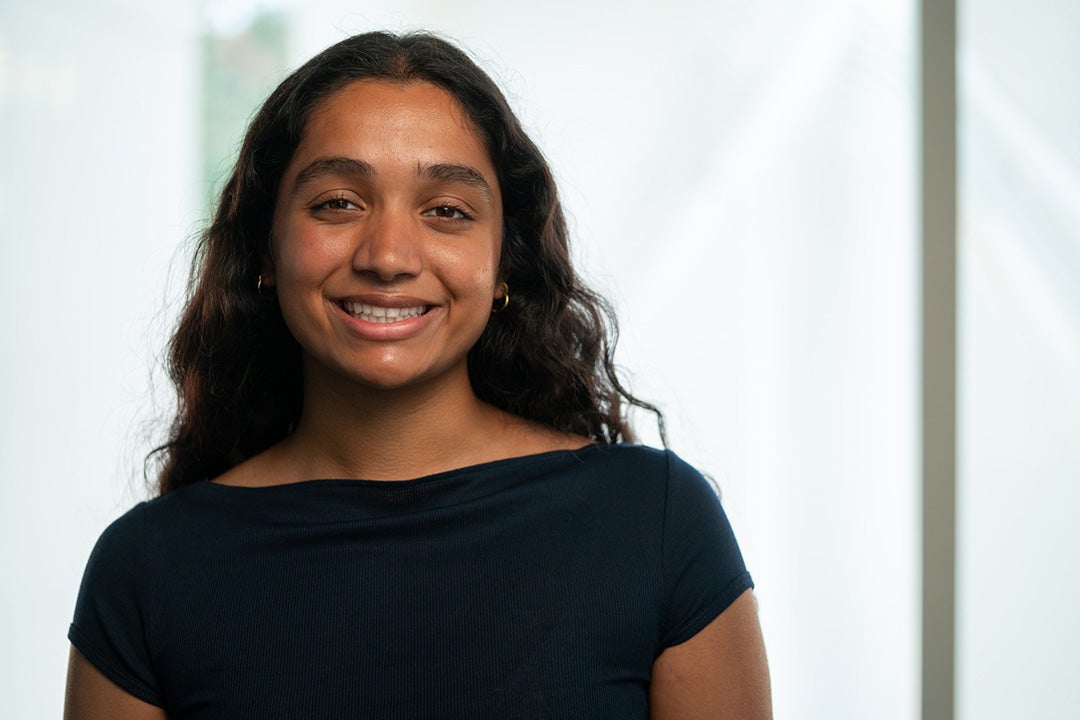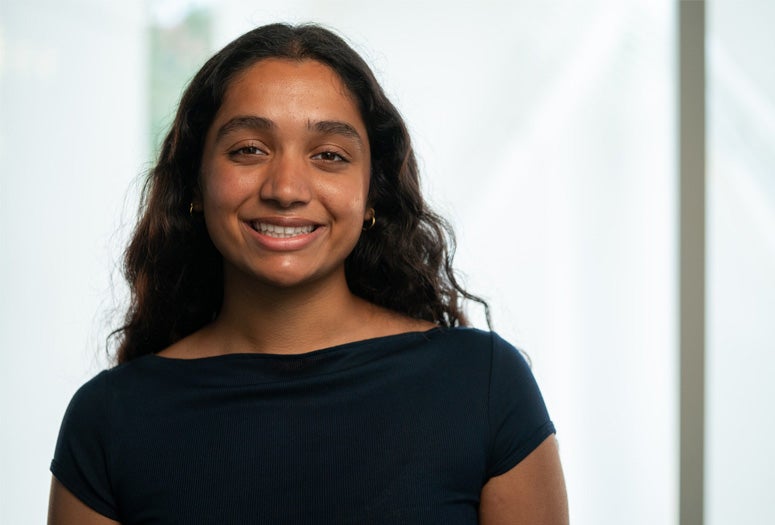
Maya Harpavat’s love of writing began when she was 6 years old, sitting at the kitchen table with her father.
“We would write stories together and read them out loud on a toy microphone,” the Rice University junior said. “That’s such a vivid memory for me.”
Harpavat, who is double-majoring in health sciences and English with a minor in medical humanities, said she views writing as a powerful tool for healing.
“I am interested in how we can use creative writing in conjunction with health care for self-expression. Taking care of mental health allows patients to better respond to physical treatment as well. This can help people with different types of care,” Harpavat said.
Her exploration of writing’s healing potential started during the isolation of the COVID-19 pandemic when she was a sophomore in high school. As the eldest sibling in a busy home with two health care professionals attending to patients, Harpavat discovered solace in creative nonfiction.
“I found that it was a great outlet to be able to process everything that was happening so quickly,” Harpavat said.
Seeing the impact it made for her, Harpavat decided to share the outlet with others. She launched writing workshops for two KIPP schools, connecting with fourth and fifth graders over Zoom each week.
“Many students who joined in would complain at first,” Harpavat said. “They said they hated writing or that they’d rather be playing video games. But soon we started to trust each other and connected so well. All of these students suddenly had an outlet in the middle of the pandemic to be able to write about what they were going through.”
Harpavat’s interest in medical humanities deepened at Rice, particularly through her work as a Moody Fellow. The Elizabeth Lee Moody Undergraduate Research Fellowship in the Humanities and the Arts invites humanities majors to join a cohort of fellows dedicated to critical research and innovative creative work. The competitive program offers students tools, resources and opportunities to conduct humanities research across diverse disciplines.
“As a student who wants to go into medicine, the Moody Fellowship has helped me realize that I can do human-centered humanities research viewing science from different perspectives,” Harpavat said. “Alongside more traditional wet-lab research, research in the humanities should intersect with many disciplines like medicine.”
The fellowship allowed Harpavat to design and host a four-week expressive writing workshop at Halo House, a nonprofit that provides affordable housing and support for blood cancer patients and their caregivers.
“Maya is a compassionate writer, thinker and human being,” said English lecturer Cameron Dezen Hammon. “Through projects she’s developed like Halo House, she’s developed a clear understanding of how storytelling and creative writing can intersect with medicine in ways that help patients process their lived experiences.”
With insights from mentors such as Hammon and Melissa Bailar, executive director of Rice’s Medical Humanities Research Institute, Harpavat developed a curriculum to guide participants to create their own toolkit for healing. The workshops integrated writing techniques including dialogue, description and storytelling with themes such as resilience and recovery. While Harpavat said she originally thought patients going through cancer treatment would join, their caregivers were the ones who attended the workshops.
“Maya has an admirably service-oriented mindset and is dedicated to putting her medical humanities and creative writing skills to work in order to attend to patients’ social and emotional needs,” Bailar said. “When Maya led her first series of workshops at Halo House in summer 2024, she created an environment in which participants felt safe to share their intimate feelings. Some had not written much before and were very nervous, but thanks to her deeply empathetic nature, Maya put them at ease and built their confidence.”
The sessions proved transformative. Harpavat recalled one participant — a woman with no prior creative writing experience — who began using her notebook to write about what she was feeling during hospital visits and sleepless nights as her husband went through chemotherapy.
“It was really powerful,” Harpavat said. “It’s very healing in the sense of being able to express yourself.”
For caregivers grappling with fear and uncertainty, the workshops offered a means of confronting their emotions.
“There are a lot of thoughts that you grapple with if someone you love is fighting cancer, like fear of the future,” Harpavat said. “‘What am I going to do if I go home and my husband isn’t with me anymore?’”
The experience at Halo House reinforced Harpavat’s belief in the accessibility of writing as a therapeutic tool.
“There are not enough mental health care treatments that are affordable,” she said. “You can tell someone to go to therapy, but treatment isn’t always readily available.”
Now Harpavat is working to expand the reach of her workshops.
“Maya is clearly dedicated to serving individuals, but her work in the Moody Fellowship Program demonstrates her talent for designing systemic interventions to improve the experience of health care,” Bailar said. “She not only developed guidelines and a flexible curriculum for others to lead their own series of workshops, she is now creating a virtual version of the series to provide access to more patients and caregivers.”
Harpavat is also collaborating with Brighter, a Dallas-based magazine for women undergoing cancer treatment.
“This is a really big goal, but in the future it’d be awesome to have something like this integrated into a regular part of cancer therapy and to have this as a tool that physicians are able to encourage,” Harpavat said.
Looking ahead to her future after graduating from Rice, Harpavat said her experience as a Moody Fellow has strengthened her plans to attend medical school — one that includes a program with strong humanities research opportunities.
“It really helped me so much in the way I look at research, the way I’ll look at research in the future and the type of physician I want to be,” Harpavat said. “When I look back at Rice in general and, honestly, my whole life, this experience really stands out as powerful in shaping me. I’m so thankful to have this opportunity.”

